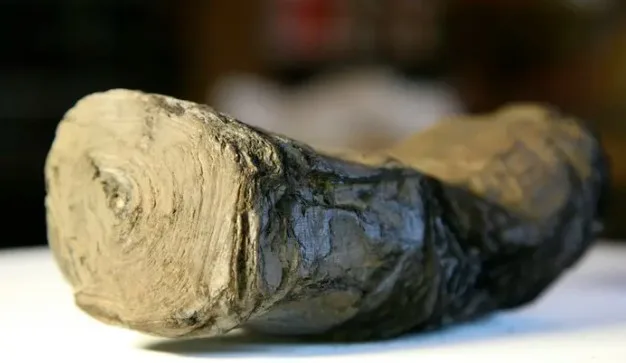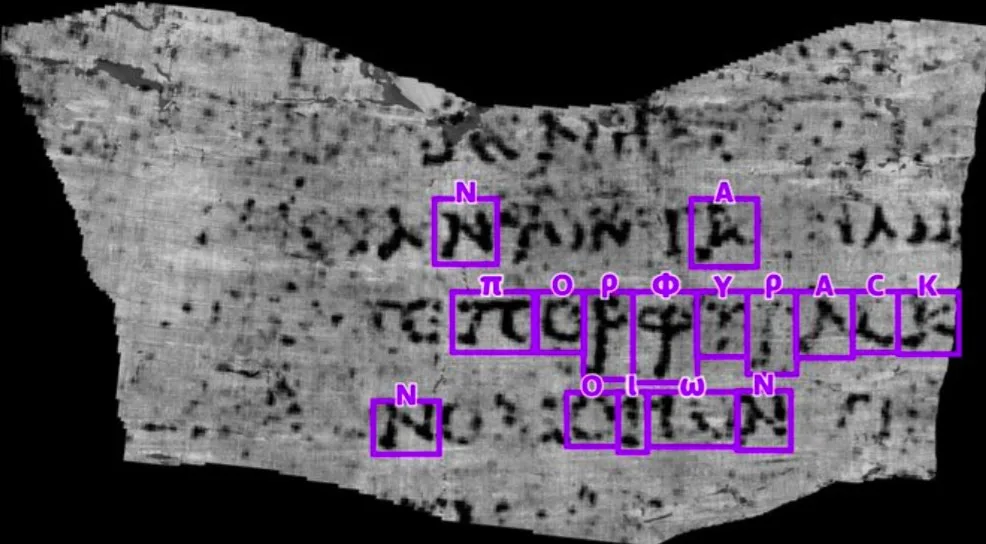AI deciphers ancient Herculaneum scroll, revealing hidden Greek text
In a remarkable breakthrough, a 21-year-old computer science student, Luke Farritor, has successfully decoded the content of an unopened, charred scroll from the ancient Roman city of Herculaneum. This scroll, buried by the eruption of Mount Vesuvius in AD 79, has remained unreadable for nearly 2,000 years. The achievement is a significant milestone in the Vesuvius Challenge, which aims to unlock the secrets of these ancient texts.
The breakthrough came with the assistance of artificial intelligence (AI). Farritor developed a machine-learning algorithm that utilised subtle differences in surface texture to detect Greek letters on the rolled-up papyrus. The first word uncovered was "πορφυρας" (porphyras), signifying "purple dye" or "cloths of purple."
Today we are announcing a major breakthrough in the Vesuvius Challenge: we have read the first word from an unopened Herculaneum scroll.
— Nat Friedman (@natfriedman) October 12, 2023
The word is "πορφυρας" which means "purple dye" or "cloths of purple."https://t.co/0EDGBX4t4h
Congratulations to 21yo computer science… pic.twitter.com/VLwtU9I8xl
@elonmusk this was done by a SpaceX intern, btw!
— Nat Friedman (@natfriedman) October 12, 2023
This discovery could potentially open the doors to countless texts from Herculaneum's intact library, the only one to survive from Greco-Roman antiquity. Historians and scholars are enthusiastic about the prospect of gaining insights into ancient history and literature, as most classical texts known today have undergone centuries of copying, while the Herculaneum library contains works directly from the original authors.
Previously, scholars could only study opened fragments of the scrolls, many of which contained Greek texts related to the Epicurean school of philosophy. More than 600 scrolls, mostly housed in the National Library in Naples, remained intact and unopened until now.
The breakthrough was made possible by Dr. Brent Seales and his team at EduceLab, who developed methods to virtually unwrap the delicate papyrus layers using 3D X-ray computed tomography (CT) scans. While earlier work allowed them to read a charred scroll from En-Gedi in Israel, the Herculaneum scrolls presented unique challenges due to their carbon-based ink, which did not show up on scans.
The Vesuvius Challenge, offering a grand prize of US$700,000, spurred collaboration among researchers worldwide. Luke Farritor's innovative AI approach emerged victorious in the 'first letters' category, while Youssef Nader, a graduate student at the Free University of Berlin, claimed second place.
But there's more: a few days ago, @Youssef_M_Nader, working with new segmentations from the Vesuvius Challenge segmentation team, was able to generate this image of stunning clarity and size:
— Nat Friedman (@natfriedman) October 12, 2023
This is the revolution in digital papyrology that Dr. Seales has created. Nothing like… pic.twitter.com/oFyzYpsjRi
This groundbreaking achievement offers a glimpse into the potential of AI to decode ancient texts and opens up the possibility of revealing more hidden treasures from the past. As the competition continues, there is growing optimism that this could mark the beginning of a new era in the study of ancient texts.

Read also Marble Quarry Inspires Boutique Fashion Store on the Island of Mykonos


